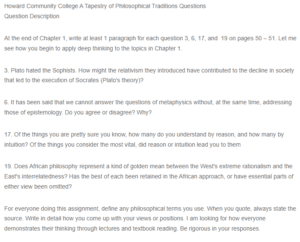A Tapestry of Philosophical Traditions
Plato hated the Sophists. How might the relativism they introduced have contributed to the decline in society that led to the execution of Socrates (Plato’s theory)?
Sophists criticized laws, religion, and ethics. They did not believe in Greek myths but referenced quotations and references from Greek takes to suit their needs. Sophists’ relativism misled people because it was founded on succeeding and winning. The decline in society emerged after the Sophists mobilized people to attend their classes and filled the classes with wealthy students to enrich themselves. Sophists also used rhetorical teachings that contradicted Plato’s philosophy, which led to the execution of Socrates, to influence students to believe in public opinion instead of only focusing on knowledge acquisition. The focus of Sophists’ teachings also led to the decline in society because they were founded on issues such as relationships, power, manipulation, and truth, contrary to what Plato was teaching. Therefore, Socrates was executed to balance harm and good by creating a sense of moral responsibility in society because Plato thought morality was the most essential and vital aspect of human life.
It has been said that we cannot answer the questions of metaphysics without, at the same time, addressing those of epistemology. Do you agree or disagree? Why?
Epistemology focuses on how people know what they perceive as truth or reality and whether there are limits to the knowledge, particularly in terms of its scope, validity, and methods. Consequently, metaphysics focuses on getting a detailed understanding of nature and reality. Therefore, I agree that it is hard to answer the questions of metaphysics without addressing those of epistemology because epistemology guides the interpretation of metaphysics to prove metaphysics beliefs. Traditional scientific methods are not reliable in proving metaphysics beliefs because metaphysics concepts such as time, identity, knowing, space, and being may sometimes directly conflict with science. Therefore, epistemology explains why metaphysics concepts are viewed as absolute, thus rationalizing metaphysical beliefs.
Of the things you are pretty sure you know, how many do you understand by reason, and how many by intuition? Of the things you consider the most vital, did reason or intuition lead you to them?
Most of the things I know are based on the knowledge I have gathered through education, personal experiences, and interaction with others. Based on the definition of intuition as the ability to understand something without conscious reasoning, I would state that most of the things I know are by reason. I evaluate situations and interpret information by creating general ideas and narrowing my thinking to settle on specific conclusions. I consider information such as what I have learned from past experiences or the experiences of others. Reason has also played a vital role in defining what I know because it led me to what I consider most critical. For example, character judgment is one of the essential things shaped over time through abductive reasoning, characterized by making observations and looking for the most likely explanation.
Does African philosophy represent a kind of golden mean between the West’s extreme rationalism and the East’s interrelatedness? Has the best of each been retained in the African approach, or have essential parts of either view been omitted?
According to Mitchell (47), the African philosophy posits that nature and people have a reciprocal relationship. Therefore, philosophy represents a kind of golden mean between the West’s extreme rationalism and the East’s interrelatedness by defining people’s conduct and how it affects their relationship with nature. For example, based on African philosophy, natural disasters such as floods and hurricanes are reminders that people are responsible for caring for nature to avoid retaliation that could adversely impact human existence. The African approach has managed to retain the best of each by rejecting the reliance on reason because it encourages people to consider practical and down-to-earth concepts. The African philosophy also considers the concepts of Western philosophy, such as the perceptions of space, time, and personhood; it focuses on how these concepts can be controlled to avoid individualism.
Works Cited
Mitchell, Helen B. “Why philosophy?” Roots of Wisdom: A Tapestry of Philosophical Traditions, Cengage Learning, 2014.
ORDER A PLAGIARISM-FREE PAPER HERE
We’ll write everything from scratch
Question

A Tapestry of Philosophical Traditions
Howard Community College A Tapestry of Philosophical Traditions Questions
Question Description
At the end of Chapter 1, write at least 1 paragraph for each question 3, 6, 17, and 19 on pages 50 – 51. Let me see how you begin to apply deep thinking to the topics in Chapter 1.
3. Plato hated the Sophists. How might the relativism they introduced have contributed to the decline in society that led to the execution of Socrates (Plato’s theory)?
6. It has been said that we cannot answer the questions of metaphysics without, at the same time, addressing those of epistemology. Do you agree or disagree? Why?
17. Of the things you are pretty sure you know, how many do you understand by reason, and how many by intuition? Of the things you consider the most vital, did reason or intuition lead you to them
19. Does African philosophy represent a kind of golden mean between the West’s extreme rationalism and the East’s interrelatedness? Has the best of each been retained in the African approach, or have essential parts of either view been omitted?
For everyone doing this assignment, define any philosophical terms you use. When you quote, always state the source. Write in detail how you come up with your views or positions. I am looking for how everyone demonstrates their thinking through lectures and textbook reading. Be rigorous in your responses.

